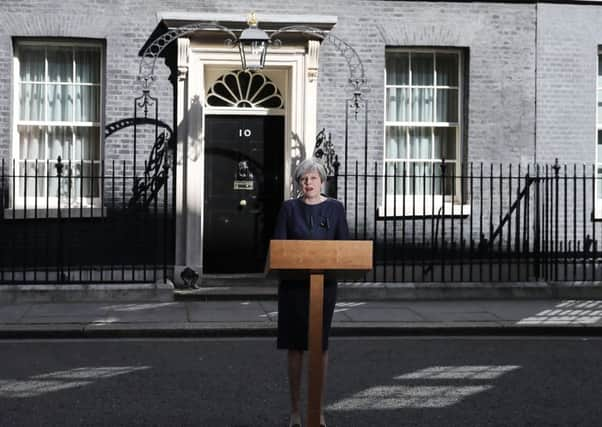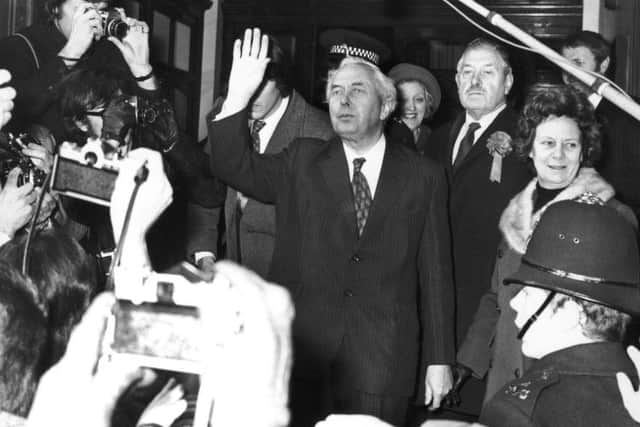Insight: 1970s tactics in Theresa May's battle for survival


The clumsy and misguided response from the Prime Minister to the disastrous fire at Grenfell Tower in west London last week compounded the personal failings uncovered during the election campaign. The decision not to meet grieving residents made homeless on an initial visit to the site drew a scathing reaction, summed up by former Conservative cabinet minister Michael Portillo, who said the Prime Minister failed to show “humanity”. Like Gordon Brown in the final months of his premiership, everything May touches seems to fall apart.
The delayed Queen’s Speech this week will confirm that much of her platform, whether it is the plan to cap energy bills or the infamous “dementia tax”, is already a footnote in political history. The comparisons with Margaret Thatcher that inspired some Tory MPs to call her “Mummy” in private conversation are long forgotten.
Advertisement
Hide AdAdvertisement
Hide AdJust one pillar of the Conservative election campaign remains standing: the threat that the country could be taken back to the 1970s. On that, May has delivered.


It was the decade when the UK earned the tag of the “Sick man of Europe”, battered by an oil crisis, miners’ strikes, rampant inflation and the three-day week. Politics were no less turbulent, and as the Conservatives prepare to strike a deal with the Democratic Unionists that will allow them to govern as a minority, Britain finds itself repeating history.
The last time a political party tried to govern on its own after failing to win a majority at a general election was February 1974. Labour scraped a narrow victory to oust Ted Heath, another Conservative prime minister who gambled with an early election and lost, but was well short of the numbers it needed to govern on its own.
In six months the country was back at the polls. Harold Wilson got his majority – a wafer-thin margin of just three seats that melted away within months.
Two days after the vote, The Scotsman’s front page gave Wilson’s government little chance of survival. “Another election likely within two years,” warned the strapline at the top of the page; below, an even more pessimistic view: “Election next year, say bookies”.


Yet Labour limped on for almost a full term, scraping together enough support from minor parties to survive until a vote of no confidence sparked by the failure to deliver Scottish devolution cleared the way for Margaret Thatcher.
Sir David Steel, who sat in both those parliaments and went on to lead the Liberal Party into the Lib-Lab pact that kept Labour in power, draws the parallel between the situation today and 1974, when Heath asked for a mandate to fight growing union militancy and lift the UK out of a financial crisis.
“In both cases, a prime minister went to the country on a single issue expecting an endorsement and didn’t get it,” Lord Steel says. “Everybody expected a second election and it duly happened, and I think that’s still likely to happen, although perhaps not quite as quickly this time round.”
Advertisement
Hide AdAdvertisement
Hide AdSo what lessons can we take away about what happens next? Will voters be trudging back to the polls within months – the eighth election in Scotland in three years? Or will the Conservatives somehow find a way to govern – and if so, how?


Helpfully, those questions were explored only recently – but perhaps not in the format you’d expect.
Two months before May called the election, the hit play This House closed at the Garrick Theatre after an acclaimed West End run. Set in the House of Commons whips’ offices in the chaotic years from the February 1974 election onwards, it gave audiences a fly-on-the-wall view of the battle to get more MPs’ bodies through the voting lobbies than the other side, by whatever means necessary.
At times, those voting were as close to being bodies as was allowed. Critically ill MPs were brought to the Palace of Westminster by ambulance to be “nodded through” once they were on the grounds. Westminster legend has it that on occasion whips would check the pulses just to make sure. Sick beds were set up in Commons offices. More than a dozen MPs died, with the stress of constantly being present for knife-edge votes at least partly to blame.
Inducements to the “odds and sods” from minor parties were standard, tricks to catch out rival whips were common, such as hiding MPs in various closets and cupboards before a last-minute charge on the lobbies when a vote was called.


This House was written in 2012 as entertainment, not a how-to guide, and playwright James Graham says he can’t believe his drama about a period that had been consigned to history is relevant again.
In a hung parliament “you’re not in control of events,” warns Graham, who broke down the whips’ code of secrecy to conduct his research. “Even if there is an alliance with the DUP, that still means you need every single member of your own party to turn up and vote, and vote with the government. That might happen for the first two or three months, but after a while, once the rot sets in… people are going to start asking for more for their loyalty.”
So are we set for a return to those political dark arts? Jeremy Corbyn says Labour is in “permanent campaign mode”, and SNP sources have promised “guerilla tactics” to beat the Tories.
Advertisement
Hide AdAdvertisement
Hide AdThe 2011 Fixed-Term Parliaments Act offers the government some protection, with its requirement for a two-thirds majority to trigger an early election, and a 14-day buffer if a confidence vote is lost in which a new government can be put together. That could ease some of the 1970s-style brinksmanship.
The past half-century has also seen reform to working practices at Westminster, with sitting times moved forward to reduce the number of late-night votes. But MPs and their staff aren’t hopeful of those surviving a long period of a minority government. A Labour aide said: “People talk about how this place has more family-friendly working hours than the 1970s. Let’s see how long that lasts.”
Minority government will pose a particular challenge in Scotland, where almost half the MPs are new and 22 have majorities of less than 5 per cent. One Conservative complained that having made the breakthrough of a generation, the 13 Scottish Tory MPs won’t find it easy to consolidate their position in their constituencies if they’re forced to spend long hours at Westminster seeing out late-night votes.“I don’t know how you run that building in a hung parliament unless you return to the slightly chaotic back and forth between government and opposition.”
“It was quite a physical parliament,” says Graham. “There were blows, there were bust-ups, there were members of parliament who were thrown up against walls.
“That was before 24-hour news and social media, so I think some of the really brutal dark arts might not return.”
But he adds: “The one weapon the opposition parties have is to disrupt, delay and paralyse, and in order to do that, you keep government ministers there for as long as possible without calling a vote.
“It’s definitely not going to be strong and stable. The definition of a hung parliament is uncertainty and chaos.”
As one of the principal “odds and sods”, Lord Steel enjoyed the play but says there was as much intrigue between senior party figures. “There was a lot of politicking going on at a higher level than the whips’ offices.” There will be late nights and dirty tricks, he says, but the need to co-operate to get things done will break down party boundaries and produce unlikely conversations.
Advertisement
Hide AdAdvertisement
Hide AdOn issues like Brexit, shared interests will matter more than party affiliation, with Conservatives including Ruth Davidson using her leverage over the Prime Minister to produce a less risky strategy for talks with the EU. “There will be quite a lot of pressure, and therefore quite a lot of cross-party discussion, whether May likes it or not,” Lord Steel says.
Westminster is already alive with reports of meetings between Labour and Tory frontbenchers, as well as talks between SNP, Lib Dem and Tory backbenchers. Government whips are also said to have met opposite numbers from minor parties.
It was the same in the 1970s, when the gossip about Labour’s survival was so intense that Lord Steel first heard about Labour’s desire to do a deal with the Liberals not from Jim Callaghan, Wilson’s successor, but over lunch with Heath.
“It does make for a more exciting parliament – although in the midst of Brexit negotiations perhaps exciting is not the best word, because it’s much too serious for that. It does mean that politics is much more open than it might otherwise have been,” Lord Steel says.
With both Downing Street and the DUP hinting at a loose arrangement of rolling negotiations, the deal they eventually strike could offer the government longevity without real stability.
“We kept clear of the Irish. It’s a hornets’ nest,” Lord Steel says. “You’ll probably find in the small print that the DUP has rubbed its fingers and gotten some cash.
“Even Jim Callaghan was playing a bit with the then Ulster Unionists, and someone said to him, ‘Look, they will always want money. They will always have a price’.
“I don’t think a deal is all that necessary,” he adds. “Confidence and supply means by definition that you will support the government on votes of confidence, and you’ll support the budget. There’s nothing else to it.”
Advertisement
Hide AdAdvertisement
Hide AdDespite the humiliation suffered by May at the ballot box and with Brexit talks imminent, at the start of last week few in her party wanted another election, or indeed a leadership challenge, any time soon.
Labour needs a swing against the Tories of just 1.63 per cent to win a majority, and all the while Jeremy Corbyn’s surge continues. A Survation poll conducted after the election put Labour six points ahead of the Tories, while May’s popularity has plummeted. Her net favorability now stands at -34, while Corbyn, once a drag on his party’s popularity, gets a neutral response of zero.
The only obvious alternative to May is Boris Johnson, a Marmite figure despite his popularity among Tory voters. Recent polling suggested he was nearly twice as popular among Conservatives as among the population at large.
The lack of leadership material is stark: trailing behind Johnson in polls are Ruth Davidson, who has a role in Scotland and couldn’t lead at Westminster, and Amber Rudd, wounded by the collapse of her majority in Hastings to just 346 votes.
Without a leader or a platform, senior Conservatives have been content to rally around the Prime Minister. “The mood has changed from one of rage to consolidation,” one minister said a few days after the result. “It’s a time for grown-ups. No-one wants to see another election.”
Another insisted there was “no appetite” to oust May, who last week appeared likely to be given the chance to negotiate Brexit before being asked to step aside.
Figures from other parties agree. “Everyone thought the coalition would collapse within six months, a year, two years – but we confounded expectations by going the full term,” a senior Liberal Democrat who was in government with the Tories between 2010 and 2015 said. “I wouldn’t put it past the Tories to try to hang on, at least until Brexit talks are concluded.”
Looking ahead to this week and the Queen’s Speech, Lord Steel predicts a “slim and vague” programme for government that puts a premium on survival. “But I think they will run into difficulties, even with the DUP, because of the internal divisions in the Tory party over Brexit.”
Advertisement
Hide AdAdvertisement
Hide AdThis House has been commissioned for television by the BBC, meaning the drama could be on our screens in a couple of years as the real thing plays out at Westminster – if the government lasts that long. Lord Steel’s prognosis for another election: “If I had to put money on it, between a year and two years.”
We could be back here again.